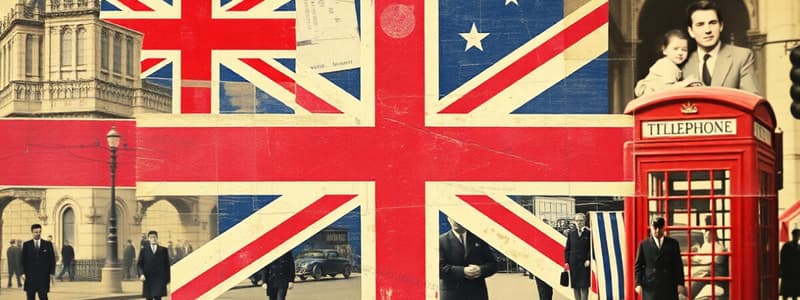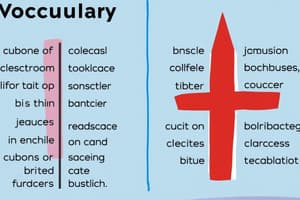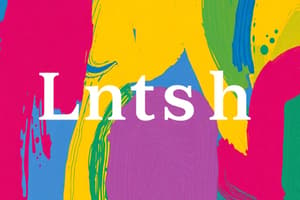Podcast
Questions and Answers
Which of the following is a general characteristic of British English conversation?
Which of the following is a general characteristic of British English conversation?
- Emphasis on politeness and indirectness. (correct)
- Pronunciation that is consistent across all regions.
- Avoidance of specific vocabulary.
- Frequent use of direct and assertive language.
In British English, the 'r' sound is always pronounced after a vowel, similar to American English.
In British English, the 'r' sound is always pronounced after a vowel, similar to American English.
False (B)
Which of these British English phrases is commonly used to mean 'thank you'?
Which of these British English phrases is commonly used to mean 'thank you'?
- Knackered
- Queue
- Cheers (correct)
- Rubbish
In British English, the term '__________' refers to a period of two weeks.
In British English, the term '__________' refers to a period of two weeks.
Match the following British English slang terms with their meanings:
Match the following British English slang terms with their meanings:
Which of the following grammatical features is more frequently used in British English compared to American English?
Which of the following grammatical features is more frequently used in British English compared to American English?
British English typically treats collective nouns (e.g., 'team,' 'government') only as singular.
British English typically treats collective nouns (e.g., 'team,' 'government') only as singular.
What is the term for playful and teasing conversation often seen in British English humor?
What is the term for playful and teasing conversation often seen in British English humor?
What does 'taking the piss' mean in British English?
What does 'taking the piss' mean in British English?
__________ is a common characteristic in British English conversations which involves downplaying the significance of something.
__________ is a common characteristic in British English conversations which involves downplaying the significance of something.
Which of the following best describes 'hedging' in the context of British English politeness?
Which of the following best describes 'hedging' in the context of British English politeness?
Respect for queueing is not typically considered a strong social norm in Britain.
Respect for queueing is not typically considered a strong social norm in Britain.
What is the name of the accent and dialect spoken in Newcastle upon Tyne?
What is the name of the accent and dialect spoken in Newcastle upon Tyne?
Which of the following phrases is a common British English way of asking if someone is okay?
Which of the following phrases is a common British English way of asking if someone is okay?
The phrase '__________' is used to emphasize the end of a discussion in British English.
The phrase '__________' is used to emphasize the end of a discussion in British English.
Which of the following conversational traits is commonly valued in British English interactions?
Which of the following conversational traits is commonly valued in British English interactions?
British conversational style encourages overly personal and emotional displays.
British conversational style encourages overly personal and emotional displays.
What is the term for substituting mild or indirect terms for offensive or blunt ones?
What is the term for substituting mild or indirect terms for offensive or blunt ones?
Which of the following presents a significant challenge for non-native speakers of British English?
Which of the following presents a significant challenge for non-native speakers of British English?
__________ humor involves making jokes about oneself to create a relaxed atmosphere.
__________ humor involves making jokes about oneself to create a relaxed atmosphere.
In British English, what is the purpose of using tag questions like 'isn't it?' or 'aren't you?'?
In British English, what is the purpose of using tag questions like 'isn't it?' or 'aren't you?'?
H-dropping, the omission of the 'h' sound at the beginning of words, is a feature found in all British English accents.
H-dropping, the omission of the 'h' sound at the beginning of words, is a feature found in all British English accents.
Match the British accent/dialect to the correct city:
Match the British accent/dialect to the correct city:
What is the name for humor is understated and delivered with a straight face?
What is the name for humor is understated and delivered with a straight face?
When might a British English speaker use the phrase "At the end of the day"?
When might a British English speaker use the phrase "At the end of the day"?
A sensitivity to the subtleties of language and context refers to __________.
A sensitivity to the subtleties of language and context refers to __________.
British English conversations typically lack practicality and promote abstract discussions.
British English conversations typically lack practicality and promote abstract discussions.
Which of these options is an example of avoiding directness in British English?
Which of these options is an example of avoiding directness in British English?
Match the phrase with its meaning:
Match the phrase with its meaning:
What kind of humor is based on everyday observations and experiences?
What kind of humor is based on everyday observations and experiences?
Flashcards
British English Conversation
British English Conversation
Vocabulary, pronunciation, grammar, politeness, humor, and social norms that distinguish it from other forms of English.
Cheers (British English)
Cheers (British English)
An expression used for 'thank you', 'goodbye', or making a toast.
Mate (British English)
Mate (British English)
A common term of endearment, like "friend" or "buddy".
Queue (British English)
Queue (British English)
Signup and view all the flashcards
Rubbish (British English)
Rubbish (British English)
Signup and view all the flashcards
Fortnight (British English)
Fortnight (British English)
Signup and view all the flashcards
Knackered (British English)
Knackered (British English)
Signup and view all the flashcards
Taking the Piss (British English)
Taking the Piss (British English)
Signup and view all the flashcards
Non-rhoticity (British English)
Non-rhoticity (British English)
Signup and view all the flashcards
H-dropping (British English)
H-dropping (British English)
Signup and view all the flashcards
T-glottalization (British English)
T-glottalization (British English)
Signup and view all the flashcards
Present Perfect Use (British English)
Present Perfect Use (British English)
Signup and view all the flashcards
Collective Nouns (British English)
Collective Nouns (British English)
Signup and view all the flashcards
Hedging (British English)
Hedging (British English)
Signup and view all the flashcards
Understatement (British English)
Understatement (British English)
Signup and view all the flashcards
Apologies (British English)
Apologies (British English)
Signup and view all the flashcards
Self-Deprecation (British Humour)
Self-Deprecation (British Humour)
Signup and view all the flashcards
Sarcasm (British Humour)
Sarcasm (British Humour)
Signup and view all the flashcards
Banter (British Humour)
Banter (British Humour)
Signup and view all the flashcards
Dry Wit (British Humour)
Dry Wit (British Humour)
Signup and view all the flashcards
Observational Humor (British Humour)
Observational Humor (British Humour)
Signup and view all the flashcards
Queueing Norm (British)
Queueing Norm (British)
Signup and view all the flashcards
Public Politeness (British)
Public Politeness (British)
Signup and view all the flashcards
Small Talk (British)
Small Talk (British)
Signup and view all the flashcards
Personal Space (British)
Personal Space (British)
Signup and view all the flashcards
Table Manners (British)
Table Manners (British)
Signup and view all the flashcards
"How do you do?"
"How do you do?"
Signup and view all the flashcards
"Fancy a cuppa?"
"Fancy a cuppa?"
Signup and view all the flashcards
"I'm just popping to the shops."
"I'm just popping to the shops."
Signup and view all the flashcards
"Are you alright?"
"Are you alright?"
Signup and view all the flashcards
Study Notes
- British English conversation encompasses a range of linguistic features, social norms, and cultural nuances that distinguish it from other varieties of English.
General Characteristics
- Specific vocabulary is used predominantly and may not be understood in other English-speaking regions.
- Accents vary widely across the UK, but some features, such as non-rhoticity, are often associated with British English.
- Grammatical structures differ from those used in American English.
- Politeness is emphasized, often employing indirect language to avoid confrontation or assertiveness.
- Self-deprecating humor involves downplaying achievements or making light of flaws.
Vocabulary
- "Cheers" is a versatile expression for "thank you," "goodbye," or a toast.
- "Mate" is a common term of endearment, equivalent to "friend" or "buddy."
- "Queue" refers to a line of people waiting for something.
- "Rubbish" means "nonsense" or "trash."
- "Fortnight" refers to a period of two weeks.
- "Knackered" means "tired" or "exhausted."
- "Taking the piss" means "mocking" or "joking."
Pronunciation
- Non-rhoticity means the 'r' sound is generally not pronounced after a vowel (e.g., "car" sounds like "cah").
- H-dropping means the 'h' sound at the beginning of words may be omitted in some accents (e.g., "house" sounds like "ouse").
- T-glottalization means the 't' sound may be replaced by a glottal stop (e.g., "better" sounds like "be'er").
Grammar
- The present perfect tense is used more frequently to describe recent events with relevance to the present.
- Collective nouns (e.g., "team," "government") are often treated as plural, especially when emphasizing the individual members.
- While less common now, "shall" is traditionally used with "I" and "we" to express future actions.
- Tag questions (e.g., "isn't it?", "aren't you?") are frequently used to confirm information or seek agreement.
Politeness and Indirectness
- Hedging uses phrases like "sort of," "kind of," or "a bit" to soften statements.
- Understatement (litotes) is employed to downplay or minimize the significance of something.
- Apologies are used frequently, even for minor inconveniences.
- Indirect language is often used to make requests or express disagreement politely.
Humor
- Self-deprecation involves making jokes about oneself to create a relaxed atmosphere.
- Sarcasm uses irony to convey humor or criticism.
- Banter is playful and teasing conversation between friends.
- Dry wit is understated and delivered with a straight face.
- Observational humor is based on everyday observations and experiences.
Social Norms
- Queueing is respected as a strong social norm.
- Politeness is maintained in public spaces.
- Small talk involves light-hearted conversations about topics like the weather.
- Personal space is respected by maintaining a comfortable distance during conversations.
- Traditional table manners are adhered to during meals.
Regional Variations
- Cockney is a distinctive accent and dialect from East London, characterized by rhyming slang.
- Geordie is the accent and dialect of Newcastle upon Tyne in North East England.
- Scouse is the accent and dialect of Liverpool.
- Yorkshire is the accent and dialect of Yorkshire, with distinct vocabulary and pronunciation.
- Scottish English is influenced by Scots, with unique vocabulary and grammar.
- Welsh English is influenced by the Welsh language, with distinct pronunciation patterns.
Common Phrases
- "How do you do?" is a formal greeting.
- "Fancy a cuppa?" means "Would you like a cup of tea?".
- "I'm just popping to the shops" means "I'm just going to the stores".
- "Are you alright?" means "Are you okay?" (often used as a greeting)
- "Full stop" is said to emphasize the end of a discussion.
- "At the end of the day" expresses a summary or conclusion.
Conversational Style
- Modesty means avoiding boastfulness and downplaying achievements.
- A good sense of humor and the ability to laugh at oneself is valued.
- Practicality and common sense are emphasized in discussions.
- Reserve is a tendency to be reserved and avoid overly personal or emotional displays.
- Euphemisms are used to substitute mild or indirect terms for those considered offensive or blunt.
- Nuance shows a sensitivity to the subtleties of language and context.
Challenges for Non-Native Speakers
- The wide variety of accents can be challenging to understand.
- Indirectness and understatement can be confusing.
- Vocabulary specific to British English may not be understood.
- Understanding and adhering to British social norms is important.
- Appreciating British humor, especially sarcasm and self-deprecation, can require cultural understanding.
Studying That Suits You
Use AI to generate personalized quizzes and flashcards to suit your learning preferences.




